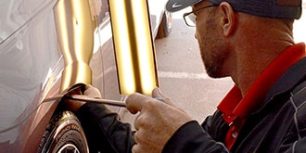Saying goodbye is never easy, even when you’re just saying goodbye to a car. After all, you and your car have been through a lot together.
When the time finally comes to upgrade, you should be asking yourself the following questions:
- What is my car worth?
- What can I do to make my car worth more?
- Have I done enough over the past several years to maintain some value?
- Have I made any mistakes that could cost me substantially?
Selling a car can, and in most cases should, take as much work and research as buying a new car, even if you plan to include it as a trade-in on your new purchase.
Car depreciation happens, and it happens quickly. It has been said repeatedly that the second you shake your car dealers’ hand and drive off the lot, your vehicle loses up to 20% of its value. In the first year of ownership, cars depreciate 30%. For specific models, depreciation can accrue up to 65% in the first three years.
Personal upkeep is a huge factor in determining car trade-in value, and keeping your car in top-notch condition can be the difference between selling a car at a price you can live with and driving away from the lot feeling exploited.
Below are five factors that affect car trade-in value and things you, as a vehicle owner, can do to make your car worth more when the time comes to sell.
1. Mileage and Mechanical Upkeep
Mileage matters. If your vehicle has more than 100,000 miles, that is a red flag for potential buyers. Even if your car has been dependable for over 200,000 miles with relatively few problems, resale value will take a huge hit.
The average person puts between 12,000 and 15,000 miles on their vehicle yearly. If you have a long commute and go above that average, chances are good that your car has been driven fairly hard, and mechanical issues are more likely to occur. Just because it hasn’t happened to you doesn’t mean your vehicle isn’t a ticking time bomb. Are you planning a big trip? Consider renting a car instead to save mileage.
Regular maintenance is a must, not only to provide reliability now but to increase resale value in the future. Follow your manufacturers’ recommended maintenance schedule, including oil and filter changes. Be sure to keep all maintenance records, no matter how minor, and have them handy when selling a car to show how well you took care of it over time.
Do you drive with your check engine light on? Your car is trying to tell you something. The longer you drive a damaged vehicle, the higher you should expect the repair bill to be.
Remember that repairs don’t provide an excellent return on investment, especially if your vehicle has been involved in a severe accident. For every $5,000 in repairs due to an accident, expect your vehicle value to be cut in half, by $2,500.
2. Vehicle Options and Selections
In 2024, vehicle buyers prioritize features that enhance their driving experience, focusing on safety, comfort, and advanced technology. While selecting options for your vehicle, it’s crucial to consider those that positively impact resale value.
- Advanced Safety Features: Automatic emergency braking, lane departure warnings, and blind-spot monitoring are now standard expectations.
- Connectivity and Infotainment Systems: Integrated systems compatible with smartphones, offering voice control and touchscreens.
- Eco-Friendly Options: Hybrid or electric powertrains are increasingly preferred due to environmental consciousness and fuel efficiency.
- Autonomous Driving Features: Semi-autonomous driving capabilities like adaptive cruise control and parking assist add value.
- High-Quality Interior: Leather seats (well-maintained), heated and ventilated seats, and spacious, ergonomic designs.
- Efficient Climate Control Systems: Including automatic climate control and air filtration systems.
- Sunroofs and Panoramic Roofs: These remain popular for their open, airy cabin feel.
Most Buyers avoid:
- Aftermarket Modifications: Performance modifications and non-standard accessories often detract from value as they can impact warranty and reliability.
- Loud Customizations: Overly bright or unconventional paint jobs and custom audio systems that are not universally appealing.
Automatic transmission continues to be a preferred choice, offering ease of use and broader appeal. Electric and hybrid vehicles often have automatic transmission as standard, aligning with current market trends.
Neutral colors like black, white, silver, and now, muted earth tones maintain their popularity and resale value. Flashy or unusual colors might appeal to niche buyers but can negatively affect the resale value.
3. Interior Condition
Do you eat and drink in your car? Do you smoke in your car? Do you take your dog along for frequent rides? All of these factors do two things to the interior of your vehicle, and both adversely affect resale value:
- They can stain or burn your carpet
- They can make your car stink
People want to buy cars that have been taken care of properly. While buyers may overlook a spot here or there, a more significant problem can arise. Buyers may think, “If this person can’t take the trash out of their car, can I trust that they took care of the vehicle mechanically?”
Before trading in your vehicle or selling it privately, try to restore your interior to appear as like-new as possible. Several great products and services specialize in odor removal. Dent Wizard offers a full suite of interior repair solutions, including carpet dyeing and repair, console and dashboard, leather, seat, and vinyl repair.
These deficiencies in a vehicle’s interior appearance can decrease the resale value by thousands of dollars, making restoration, even if you intend to sell, an excellent return on investment.
4. Exterior Condition
A ding or dent may not seem like a big deal to you, but appraisers are picky. Appraisers usually grade used vehicles on a four-point scale, with cars graded as either Excellent, Good, Fair or Poor condition.
More than 80% of vehicles fall into the “Fair” category. At the same time, a select few, usually newer used cars driven very lightly and garaged for most of their life are deemed “Excellent.”
Just one or two minor dents, dings, paint scratches or chips can be the difference between “Fair” or even “Good” or “Poor.’ It’s best to park in a garage out of the elements whenever possible.
Before trading in your vehicle, wash it professionally and take care of all dings, dents, and any other exterior deficiencies that can diminish resale value.
If you’re serious about maintaining your resale value, Dent Wizard offers Paintless Dent Repair and a full line of exterior restoration services. These services are affordable and can provide an immediate return on your investment upon resale.
Also, remember to remove all bumper stickers and trash before selling a car.
5. Market Conditions
You can’t control everything when you sell your vehicle, but the market is something to be mindful of. Some vehicles depreciate at a lower clip than others. Subaru, Honda, Hyundai, Mazda, and Toyota are brands that generally have a reputation for maintaining their value.
Like everything else in life, supply and demand is king. Even if you sell a car with an excellent reputation, a dealership won’t be impressed if they already have 12 on their lot.
Some of the most popular used vehicles are the same model as those popular now. If your vehicle is new enough to have the same body style and design as the new models, you could net an even higher resale value.
Get the Most for Your Car When You Resell
We all want to get the most out of our investments. Your vehicle is often your second most valuable asset besides your home. Protect it now and in the future, even if its future is with someone else.
Dent Wizard offers many services to help maintain and improve your vehicle’s trade-in value. Learn more about our interior and exterior repair services or contact the Dent Wizard team to discuss other options.How have you benefited from preparing your vehicle for resale? Have a story you would like to share with us? Please share your experiences with us on Facebook or X (formerly Twitter)!





